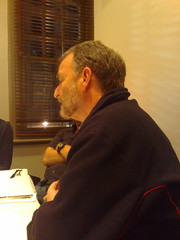I normally don't re-post articles that I write for the MarketingProfs Daily Fix, but I wanted to make sure that I shared this with you all. Generosity and grace is a topic that has been on my mind for some time – and something that goes, I think, to the heart of the transformation that we are seeing in consumer behaviour. It's also something that I touched on my post last night appealing to the Prime Minister, Kevin Rudd, to address the crisis faced by Sydney's Wayside Chapel.
You see, social media – or what I am increasingly calling "participatory media" is not just about connecting. It's more active. It's more emotionally engaging than it appears from "the outside". It's COMPASSIONATE (more on this next week). It's about moving from emotion to thought to action within the blink of an eye, the click of a mouse and the shaking of a hand. It's why I think it is the future of your brand. I'd love to hear your thoughts on generosity and grace:
We are marked each day by the casual collisions that are the artefacts of our existence. There are phone calls, messages and the relative anonymity of online interactions. And in the search for connection, communion or community, we thoughtlessly mistake message for meaning, words for action and interaction for friendship. It’s a confusion of intention – and we are the poorer for it.
When I began writing my blog I did so with no expectation of return. Like a long-dead star, I felt that I was emitting the weakest of signals with no hope of a destination. The gravity of my expectations was as light as utterance, each word or post marked only by the steam of my breath.
But over time an unexpected, slow kind of success appeared in my orbit. Each comment felt like a gift, each email a revelation, and each face emerged from the ether to reveal some other – living, breathing, longing being.
Through words, through ideas and by sharing stories we began to find each other – you and I. And each time we brushed past one another we each revealed, perhaps inadvertently, some secret or grain of truth. And yet in losing some small essence, rather than being diminished ,we grew. We prospered. Not in the way of casual connection, but in more mysterious ways – for we were encountering ourselves by way of grace.
The paradox, of course, is that with every gift of self, with the free transmission of what-is-mine to what-now-is-yours, our gravity expands. Such reality requires new thinking on all our parts. After all, who among us has not looked with envy on the success of our peers? It’s as if the well-spring of success has only finite resources and each cup taken is a cup lost to us all.
But we are living now in a time and a space where both opportunity and results are being reconsidered. We are turning towards the hard face of generosity – where an act of grace is not just expected, but is a mandatory condition for a relationship to take root. We are mercenarily applying the judgement of our peers and their peers to the decisions that we make in business, as families and as individuals.
This does not mean that we are un-generous – quite the opposite. It means that your reputation precedes you. It means we act, not alone, but in cognitive unison. We’d like you to understand this. We’d like to help you make all our worlds better places. It starts by being generous. It starts with good grace.



